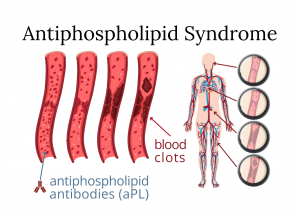Description
The antiphospholipid syndrome (APS) panel is a group of tests used to diagnose and monitor antiphospholipid syndrome, also known as Hughes syndrome. This autoimmune disorder is characterized by the presence of antiphospholipid antibodies (aPL) in the blood, which can lead to abnormal blood clotting and other complications.
The APS panel typically includes several specific tests:
- Anticardiolipin antibodies (aCL): These antibodies target cardiolipin, a phospholipid found in cell membranes. Elevated levels of aCL antibodies are associated with an increased risk of blood clots.
- Lupus anticoagulant (LA): Despite its name, the lupus anticoagulant is actually a procoagulant, meaning it promotes blood clotting. This test measures the presence of antibodies that interfere with the normal clotting process, leading to an increased risk of thrombosis.
- Anti-beta2 glycoprotein I antibodies (anti-β2GPI): These antibodies target beta2 glycoprotein I, a protein that binds to negatively charged phospholipids on cell membranes. Elevated levels of anti-β2GPI antibodies are also associated with an increased risk of blood clots.
The APS panel helps healthcare providers diagnose APS and distinguish it from other conditions that can cause similar symptoms, such as venous thromboembolism or autoimmune disorders like systemic lupus erythematosus (SLE).
It’s important to note that a positive result on any one of these tests does not necessarily indicate APS, as these antibodies can sometimes be present without causing symptoms. Diagnosis typically requires meeting specific clinical criteria in addition to positive test results.
Treatment for APS often involves anticoagulant medications to prevent blood clots, as well as measures to manage underlying autoimmune activity. Regular monitoring with the APS panel may be recommended to assess disease activity and treatment effectiveness.



Reviews
There are no reviews yet.